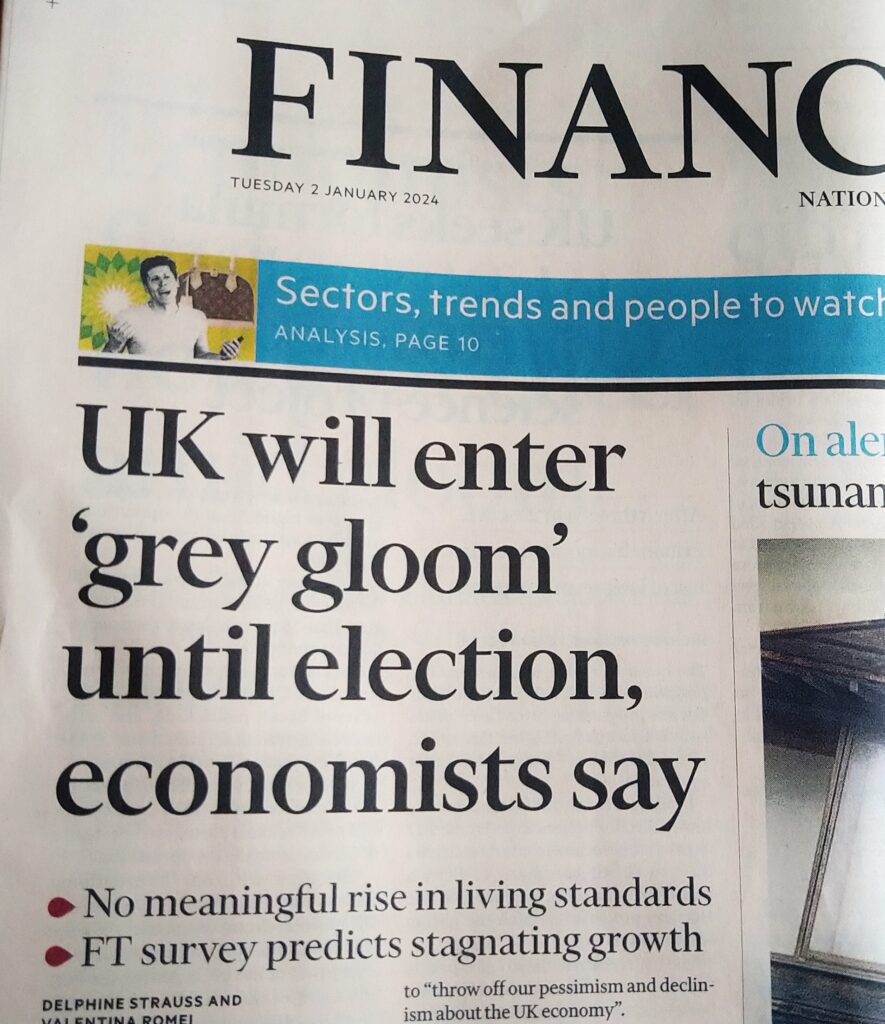Each year the Financial Times polls a group of economic analysts on what they think the next year holds in store for the UK. The New Weather Institute is part of that survey published in the paper today, and here are our responses collected together. They argue that if the government is genuinely concerned about making people feel better before the next election a sharp refocus is needed on boosting the drivers of quality of life rather than just increasing consumption. They also call for a fresh look at what constitutes economic success in the face of a climate emergency.
Mainstream economics notoriously confuses well-being and quality of life with the more quantitative measure of living standards… Negative dynamics around inequality, health, social division and nature will likely make people feel worse in the run up to the election.
Will voters feel better or worse about their living standards in the run-up to the election?
Negative dynamics around inequality, health, social division and nature will likely make people feel worse in the run up to the election. To guess how voters will feel about their living standards, you have to look at what really drives people’s subjective response about their access to, and consumption of, goods and services. Mainstream economics notoriously confuses well-being and quality of life with the more quantitative measure of living standards. But beyond the point of fairly basic material security, other factors than levels of consumption are stronger in terms of shaping how people feel. One of the strongest influences over how people feel is the degree of economic inequality coupled with perceptions of fairness. Both of those are looking bad, given that the pay gap at Britain’s biggest 350 companies widened last year, with CEOs taking 57 times more than the median wage, and the government performatively scrapped the cap on bankers’ bonuses.
A combination of underfunding, waiting lists, a failure to deliver on the post-Covid social contract to honour the extraordinary contribution of the NHS, coupled with high profile cases of brazen profiteering and nepotism around health contracts will undermine how people feel about health. Fear mongering and the political exploitation of migration as an issue is obviously socially divisive and, however unfounded, has the effect of making people feel less secure jobs, housing and access to services.
Prioritising polluting cars over clean air in towns and cities and abandoning nature and access to greenspace targets, in the name of political gain, will also undermine any feel good. Access to nature has a profound influence over well-being. Another significant influencing factor is people’s relative sense of agency, connection and participation. But, this government’s centralisation of powers, for example around the Levelling Up Bill, means it can increasingly ‘override development plans that were democratically approved by local communities’, as the charity CPRE put it. All told, the government is conjuring a perfect storm to make people feel worse in the run up to the next election.

Will the Bank of England win its fight against inflation in 2024?
It is worth restating that many of the things influencing the rate of inflation are factors beyond the control of the Bank of England. A big element, the price of energy, is already in retreat. Inflation was also up due to post-Brexit supply chain problems and the shock of Putin’s war of aggression against Ukraine. But those shocks have already happened, and because inflation compares current with previous prices that were hit by those dynamics inflation would reduce regardless of the Bank maintaining punitive interest rates. There are however lessons from the last few years that the Bank could learn from.
What the Bank should do to insulate Britain as far as possible from the inflationary effects of future external shocks to the economy, is ensure that cheap money is available to invest at scale in domestic renewable energy, housing retrofit, circular-economy manufacturing and sustainable food production. This could be achieved in tandem with government by using its influence over Banks, risk management, institutional investors and targeted public money creation.
Will the UK economy escape stagnation in 2024 – and if so, will it outpace or lag other advanced economies?
Don’t mistake the old-fashioned measure of GDP growth with success for the UK. They are not the same thing. What matters more is the degree of progress, stagnation or reversal in the transition to a zero, or negative carbon, high well-being economy. These are terms the in which it is meaningful to ask if we are outpacing or lagging behind other countries. To escape a kind of polluting stagnation means public and private investment in the green sectors where good jobs will be created at scale that allow us flourish within planetary boundaries. The Green New Deal still provides the available model and plan that delivers multiple, simultaneous economic, social, well-being and environmental benefits to do that. The government’s attempt to weaponise an anti-environmental stance, has been met with weak response. Meanwhile, Keir Starmer, the Labour opposition leader’s cry of, “When Rishi Sunak says roll back on our climate mission, I say speed ahead,” suggests that with an early election the benefits of a green stimulus programme could kick in quickly.
Without a quick change of direction the UK looks ready to slip into reverse. With the latest research indicating that the economic costs of global heating are high, rising and probably underestimated, the Climate Change Committee reports that the UK is missing climate targets on nearly every front, and the National Audit Office found that the UK has no effective strategy in place to make the country resilient in the face of global heating.
Which single policy change after the next election would do most to boost the UK’s long-term growth?
This is simply the wrong question. Anyone with an interest in averting the collapse of the economy’s ultimate owner, the biosphere, would be asking which single policy after the next election would create an economy with the highest well-being and the lowest impact on climate and nature.
The answer to that question is a Green New Deal designed to reverse inequality and shift from an extractive to a regenerative economic system. Obviously no one policy can do everything but public investment in future proofing the UK, such as with a massive home retrofit programme, in such a way that you create good green jobs, reduce dependence on fossil fuels, make healthier homes, and lower heating and cooling costs is a very good start. Moving to a shorter working week, underpinned by better child care and measures to tackle the affordability of housing by protecting the market from speculative pressures and excessive rent-seeking would also raise well-being, and help to break the work and spend cycle that locks in over-consumption. Of course, to achieve many of these things in the UK, electoral reform is probably needed to break the log-jam of the two-party system, it’s timidity around necessary, urgent action on climate breakdown and inequality, and to allow for a more fresh, representative and accountable politics.
Anything to add?
Last year was again the hottest on record. The latest scientific research points to the economy breaching numerous planetary tipping points with irreversible impacts on natural systems underpinning human livelihoods. It is time for both the economy’s performance and its prospects to be assessed in this light.












